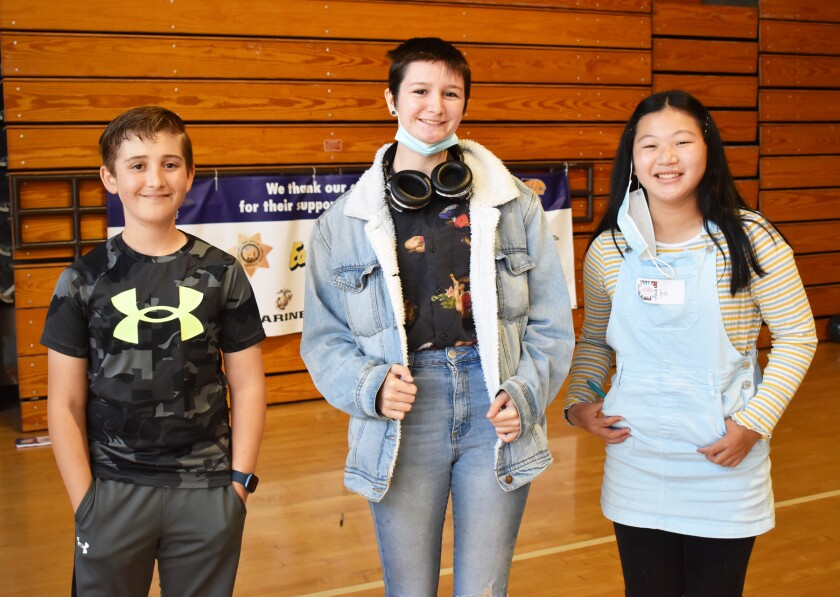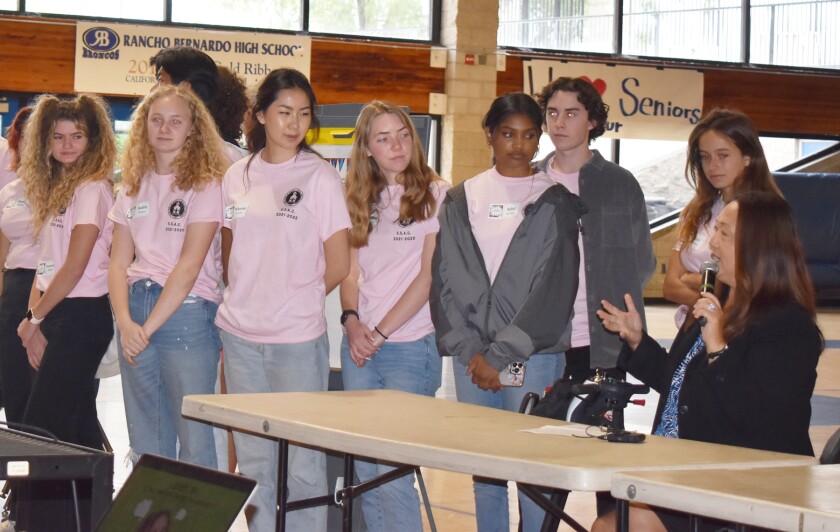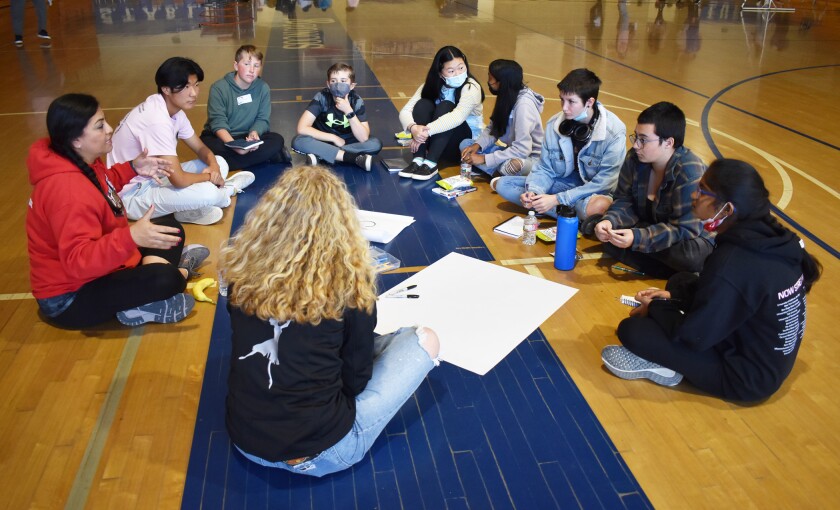[ad_1]
Mental health struggles are a real possibility for middle school students who are dealing with stress from homework, activities, peer interactions, the pandemic, and for some, the start of medical-related challenges.
To help encourage discussion about mental, social and emotional health, more than 60 middle schoolers from throughout Poway Unified School District attended the inaugural Middle School Mental Health Conference. It was held on March 30 at Rancho Bernardo High School.
During the three-hour event, participants learned about various struggles they and their peers could experience as teens. They also learned how as campus leaders they can normalize the topic of mental health by talking about these struggles and where to find resources.
“Middle school is an important time in their life where they are getting ready for adulthood … but it can also be a confusing time,” said PUSD Superintendent Marian Kim Phelps. “They are getting the tools to navigate this phase of their life.”
The students were selected by teachers and administrators to be mental health leaders on each of the district’s seven middle school campuses. They participated in small group discussions and activities and heard from speakers, including keynote speaker Christine Marie Frey, a 20-year-old mental health advocate who founded Brain XP, which offers free resources such as a teen toolbox of coping skills, videos and podcasts.
Newsletter
Get the Pomerado News in your inbox weekly
Top headlines from Poway, Rancho Bernardo and 4S Ranch, every Thursday for free.
You may occasionally receive promotional content from the Pomerado News.
Twenty high school students on the Superintendent’s Advisory Council helped plan the conference and led some of the activities and discussions.
Del Norte High junior Brayden Lou, 17, said the council’s goal was to provide middle schoolers with the resources they will need for the coming years.
“We want them to help their peers mentally get ready for the challenges of high school,” Lou said. “There is stress with friends and a lot more homework stress. … There is middle school drama in their friends group, cliques and social groups. We want to help them understand they are not alone.”
The conference topic was chosen in response to a survey conducted among middle schoolers to learn what their most prevalent need is right now, according to Phelps.
“COVID really isolated students and the students are trying to adjust coming back, interacting, having conversations and making eye-to-eye contact,” said Bernardo Heights Middle School ASB Adviser Meera Navarro, who accompanied seven students to the conference.
“They were on screens for so long that they are no longer comfortable interacting with people,” Navarro said. “They need to brush up on their interpersonal skills.”

Bernardo Heights Middle School students Alex Gilbert, Ainsley McIver and Iris Liu were among the more than 60 middle schoolers throughout Poway Unified School District selected to be mental health leaders on their campuses.
(Elizabeth Marie Himchak)
Bernardo Heights sixth-grader Alex Gilbert, 12, said homework is one of the stresses he and his classmates face.
“Being so far apart (during the pandemic) definitely caused emotional and physical problems,” Gilbert said. “There was also the social aspect.”
Ainsley McIver, an eighth-grader, runs the Mental Health Awareness Club at Bernardo Heights.
“My friends group struggled with mental health during the pandemic,” 13-year-old McIver said. “There were increased issues making it harder to be isolated.”
Bernardo Heights seventh-grader Iris Liu, 12, said she grew apart from friends during the pandemic and has been having a hard time getting her support system back.

Some of the Superintendent’s Student Advisory Council members, who facilitated the mental health conference, with Supt. Marian Kim Phelps, seated right.
(Elizabeth Marie Himchak)
Keynote speaker Frey shared her experiences with anxiety that appeared at age 11 when she was in sixth grade. She told the students that the pre-teen years are when symptoms of mental health issues such as anxiety and depression can start showing up.
“As a child, I had close to an ideal life — a very supportive family and I was a social butterfly,” Frey said. “But I had unnoticed signs of anxiety, like really being scared of being picked last.”
While Frey said she went on sleepovers for several years, suddenly in sixth grade she struggled with it and her mother had to pick her up from friends’ homes.
“I tried to go to sleep, but couldn’t. I had a pit in my stomach and did not feel right,” Frey said. “I did not know it was anxiety.”
Frey said she started counseling because she wanted to go to sixth grade camp. The coping strategies she learned over several months worked.
“I went on the trip with no problems,” she said. “I had a blast. My anxiety was there, but I knew how to manage and cope.”
But by seventh grade she became isolated, would not speak with anyone unless spoken to first, was sad all the time, crying daily and showing signs of depression, which a teacher noticed.
“I was not depressed at home, it was like I was a different person,” Frey said.
She went back into counseling and said it quickly became evident she was experiencing psychosis and hallucinations.
“Struggling with mental health is rough, the stigma was everywhere I went,” Frey said.
She told the students that by high school she had no friends and did not know how to form friendships.
“If you see someone struggling, reach out to them,” she said. “Being a friend goes a long way.”
When someone is dealing with mental health issues, Frey said, it not only impacts that person, but their family and friends.
At 16 Frey published her autobiography, “Brain XP: Living with Mental Illness, A Young Teenager’s Perspective,” which won international book awards.
Wanting to help other teens experiencing mental health struggles, the San Diegan said she founded Brain XP, which at brainxp.org offers a number of free resources including the teen toolbox, videos, blogs and podcast episodes. She also does speaking engagements and offers some paid services, such as a private family training session on Brain XP’s System of H.O.P.E.
The System of H.O.P.E. Course focuses on healthy mind, open sharing, positive coping and empowerment, she said.
“Having mental health challenges can seem like living in a novel sometimes,” Frey said. “I am changing the language of mental health by focusing on positivity.”
By participating in the conference, Phelps said students were being “empowered to make a difference with students who are struggling with the same things, making it normal to talk about these things out loud.”
The message Phelps said she hoped students took from the conference was: “We are all struggling in different ways, mental, social and emotional wellness, all trying to figure out and support one another. They are not alone, there are resources and people who want to help.”
After a final small group discussion on how to implement what they learned, Navarro said her students talked about making classroom presentations and exploring other ways to share information with their peers.
“I believe the kids now have the tools to bring back to their campus and help their classmates handle and cope with stresses,” Navarro said.

Bernardo Heights Middle School ASB Adviser Meera Navarro, far left, talking with her students on how they can bring what they learned back to their campus and share with peers.
(Elizabeth Marie Himchak)
[ad_2]
Source link




More Stories
The Ultimate Work Desk Kit: From Eye Drops to Vicks Roll On
Essential Insights into Atlanta Insurance: Your Ultimate Guide
Transform Lives by Giving Plasma: A Comprehensive Guide